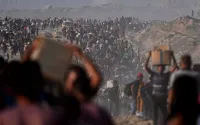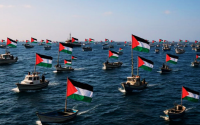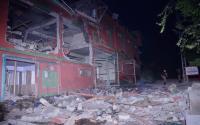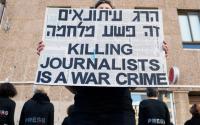Published on Tuesday, January 27, 2004 by the New York Times |
Dilip Hiro
In calling the capture of Saddam Hussein "crucial to the rise of a free Iraq," President Bush forgot the old saw about being careful what you wish for. Six weeks later, the administration seems shocked by the effect that event had on the country's Shiite community, which makes up 60 percent of the population.
No longer worried about the return of Saddam Hussein, the Shiites — led by Grand Ayatollah Ali al-Sistani — are focusing on the second part of their much-shouted slogan, "No, no to Saddam; no, no to America." And the Bush team seems unable to stomach the idea that democracy in Iraq will mean Shiites assuming power, and most likely developing close ties with Shiite-dominated Iran.
So now President Bush and his proconsul in Baghdad, L. Paul Bremer, are watching as Ayatollah Sistani, a recluse who had remained above the political fray, turns into the second coming of Iran's Ayatollah Ruhollah Khomeini. More embarrassingly for an administration that fought a "war for democracy," it is now opposing Ayatollah Sistani's call for direct elections to the new national provisional assembly.
Mr. Bremer and the American-appointed Iraqi Governing Council give many reasons for ruling out quick elections: the electoral rolls are not up to date; the political parties are not functioning properly; and the security situation is not conducive to election campaigns. All of these arguments fall apart on closer scrutiny.
For one, the voter rolls may be outdated, but since 1991 all Iraqis have been issued food ration cards that could be used as identification at polling stations. Mr. Bremer and some governing council members object that using ration cards would disenfranchise exiles who have returned since Saddam Hussein's fall. Yet there are only about 250,000 Iraqi returnees and all should have documents from the countries of their exile that would suffice as identification.
Some Iraqi families had their cards taken away by the Baathist regime because a family member deserted the army. But another identification document exists, a "census card" provided to all Iraqis when they reached school age, giving the student's name, address and age. It is worth noting that within two months of the overthrow of the shah of Iran in February 1979, the revolutionary government used the fallen regime's identification cards to hold a referendum on whether Iran should be an Islamic republic.
As for the argument that political parties are needed, Iran offers another precedent. In August 1979, the Islamic authorities held elections to the constitutional Assembly of Experts. Almost all of the candidates ran as individuals rather than as party affiliates, yet they were able to campaign and get their messages out to voters.
Critics also say that Iraqis have no recent tradition of elections. Actually, Iraq had five elections for its 250-member Parliament from 1980 to 2000. Though all the candidates were pre-approved by the regime, voters did get a choice between Baathists and non-Baathists (the Baathists' share of seats ranged from 142 to 183). The point is, some people felt free to express a personal preference.
Perhaps the central criticism is that Iraq is simply not secure enough to have a fair vote. But this is not sufficient grounds to deprive Iraqis of their say in their own political future. In May 1992 the Kurdish parties operating in Iraq's no-flight zone held elections for their new regional Parliament under conditions that were pretty grim. Only by holding that poll did the Kurdistan Democratic Party and the Patriotic Union of Kurdistan achieve the legitimacy they hold to this day.
Likewise, security in post-revolutionary Iran was almost as bad as in Iraq today. The shah's 440,000-strong army had melted away. Assassinations by anti-Islamic elements claimed the lives of a leading ayatollah and the army chief of staff. The new rulers were carrying out purges of military and civilian bureaucracies. Secular and leftist Islamic guerrilla organizations refused to surrender their arms. There was armed rebellion in the Kurdish region, and ethnic Arabs were sabotaging oil facilities and pipelines. Yet the referendum and general election were held within six months of the shah's being deposed.
The least that Mr. Bush and Mr. Bremer, the high priests of Middle Eastern democracy, can do is to emulate the mullahs of Iran, whose commitment to representative government stems from injunctions in the Koran including, "Those who answer their Lord and perform the prayer, their affair being counsel between them."
Here's a suggestion: hold elections on two separate days. On Day 1 the voting should be held in the relatively pacific Shiite and Kurdish areas, and then the bulk of American and Iraqi military and police forces could be moved to the turbulent Sunni areas for a vote there one or two days later. India holds its elections in this way — shifting troops into Kashmir and other regions with separatist insurgencies.
Unfortunately, Washington now seems to be backing a plan concocted by Adnan Pachachi, who holds the rotating presidency of the Iraqi Governing Council this month. He proposes simply expanding the council to 75 or 100 members from the current 25, so that sovereignty can be passed to it by June 30. Direct elections to a national assembly would be put off until at least the end of the year.
This proposal would be counterproductive. The governing council has little moral authority — its members have placed so many relatives in ministerial jobs that many Iraqis derisively call it the "government of near and dear ones." Allowing its American-chosen members to become a transitional government would give support to the claim of one Sistani associate, Sheik Abdel Mahdi al-Karbalai, that "the occupying power has its colonial and diabolical plans to design Iraq's politics for its own interests."
So why is the United States so set against elections? The most concise answer was provided by Noah Feldman, a New York University law professor who was the Coalition Provisional Authority's constitutional law adviser. "If you move too fast," he told this newspaper, "the wrong people could get elected." Indeed, a poll in October by the Center for Research and Strategic Studies found that 56 percent of respondents wanted an Islamic Iraq.
The United Nations is preparing to send electoral experts to Iraq to decide if a vote before June 30 is feasible. A thorough assessment should find that elections are not only possible, but necessary — and one hopes the Bush administration will be persuaded to agree. Otherwise we will be left with a troubling contradiction: President Bush insisting that he has liberated 25 million Iraqis from tyranny, while at the same time denying them the right to self-determination.
Dilip Hiro is the author of "Secrets and Lies: Operation 'Iraqi Freedom' and After" and "Iran Under the Ayatollahs."






